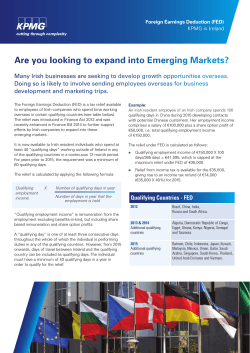
Euro Tax Flash from KPMG's EU Tax Centre
Euro Tax Flash Issue 238 - November 12, 2014 Euro Tax Flash from KPMG's EU Tax Centre ECOFIN progress on EU Financial Transaction Tax and proposed GAAR in the Parent-Subsidiary Directive ECOFIN – FTT – Enhanced Cooperation – Tax Avoidance – Parent Subsidiary Directive On November 7, 2014 the Council of the EU (ECOFIN) considered in more detail both the proposal for a Directive on a Financial Transaction Tax (FTT) for those Member States participating under the enhanced cooperation regime, and the proposal to introduce a general anti-avoidance rule (GAAR) into the Parent-Subsidiary Directive. The discussions did not result in either proposal being approved. Status of the proposed FTT On October 31, 2014 the EU presidency indicated that work needed to be intensified to enable agreement in the near future on the issues that remain open with the aim of implementing the first phase of the FTT by January 1, 2016. The first issue discussed at the ECOFIN meeting was the scope of the FTT. While agreement has been reached that transactions in the shares of listed companies should be taxed, further work is still required to agree on the extent to which transactions involving other financial instruments such as derivatives should also be subject to the FTT. The second issue, i.e. whether the FTT should be levied on the basis of the place of establishment of the participating financial institutions or where the financial instrument was issued, or both, (the “residence” or “issuance” principle), has not been resolved between the participating Member States. The jurisdictional scope of the FTT remains controversial outside of the eleven Member States involved in the enhanced cooperation procedure insofar as financial institutions established outside a participating jurisdiction could become liable to the tax. EU Tax Centre Comment In view of the disagreement, even among the eleven participating Member States, as to the exact scope of the transactions to which the FTT will apply and the underlying principle of taxation, the goal of reaching agreement before the end of 2014 and the implementation of a first phase of the FTT in January 2016 now seems ambitious. Introduction of GAAR to the Parent-Subsidiary Directive The Council also discussed the draft amendment to the ParentSubsidiary Directive introducing a binding anti-abuse clause to prevent the misuse of the Directive for tax avoidance and aggressive tax planning purposes. The GAAR would require Member States to introduce rules that refrain from granting the benefits of the Directive to any arrangements that have been put in place to obtain a tax advantage that defeat the purpose of the Directive and which lack valid commercial reasons reflecting economic reality. Member States would be free to apply stricter domestic rules as long as they meet the minimum EU requirement. The majority of Member states were ready to support a compromise text proposed by the Presidency and expressed a commitment to work constructively towards reaching an agreement at the forthcoming ECOFIN meeting on December 9, 2014. EU Tax Centre Comment This development forms part of EU efforts to combat aggressive tax planning. The proposed GAAR faced initial concerns that it could lead to different interpretations in different Member States leading to uncertainty for businesses. It remains to be seen whether these concerns can be sufficiently settled for all Member States to agree. If agreement can be reached at the forthcoming meeting it will supplement the recent approval of the anti-hybrid rule to the ParentSubsidiary Directive which is specifically aimed at preventing the Directive from facilitating double non-taxation arising from certain hybrid loan structures. Member States are required to introduce the new anti-hybrid rules by December 31, 2015 (see ETF 230). Should you require further assistance in this matter, please contact the EU Tax Centre or, as appropriate, your local KPMG tax advisor. Robert van der Jagt Chairman, KPMG’s EU Tax Centre and Partner, Meijburg & Co vanderjagt.robert@kpmg.nl Barry Larking Director EU Tax Services, KPMG’s EU Tax Centre larking.barry@kpmg.nl Back to top kpmg.com/socialmedia kpmg.com/app Privacy | Legal KPMG's EU Tax Centre, Laan van Langerhuize 9, 1186 DS Amstelveen, Netherlands Euro Tax Flash is published by KPMG International Cooperative in collaboration with the EU Tax Centre. Its content should be viewed only as a general guide and should not be relied on without consulting your local KPMG tax adviser for the specific application of a country's tax rules to your own situation. The information contained herein is of a general nature and is not intended to address the circumstances of any particular individual or entity. Although we endeavor to provide accurate and timely information, there can be no guarantee that such information is accurate as of the date it is received or that it will continue to be accurate in the future. No one should act on such information without appropriate professional advice after a thorough examination of the particular situation. © 2014 KPMG International Cooperative (KPMG International), a Swiss entity. Member firms of the KPMG network of independent firms are affiliated with KPMG International. KPMG International provides no client services. No member firm has any authority to obligate or bind KPMG International or any other member firm vis-à-vis third parties, nor does KPMG International have any such authority to obligate or bind any member firm. All rights reserved. The KPMG name, logo and “cutting through complexity” are registered trademarks or trademarks of KPMG International.
© Copyright 2025





















